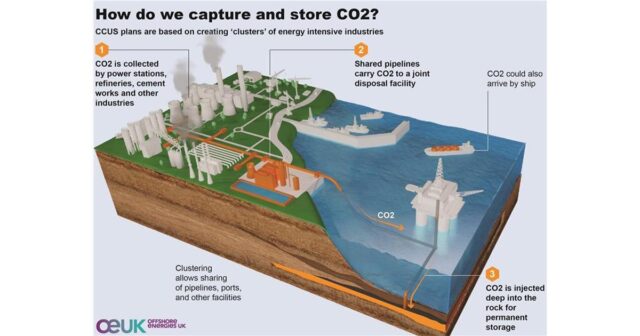Globally, nations are grappling with the challenge of meeting their energy demands while addressing the urgent need to combat climate change. Prime Minister Rishi Shunak’s recent policy move to license over 100 energy projects in the North Sea, encapsulates this complex dilemma faced by governments. While the move promises positive outcomes for energy security and possible climate change gains, it has faced significant criticism, particularly concerning the UK’s commitment to net zero.
Why is the North Sea important?
The North Sea has historically served as a crucial source of oil and gas for the UK. However, recent years have seen a decline in production due to factors such as aging infrastructure, maturing fields, and depleting reserves, which have posed economic challenges for oil and gas extraction. Following its peak in 1999, production in the North Sea has exhibited a consistent decrease, a decline from 4.5 million barrels of oil equivalent per day (boe/day) in 1999 to 1.4 million boe/day in 2014. In spite of this decline, the North Sea retains significant petroleum reserves. The North Sea Transition Authority (NTSA) estimates the UK continental shelf reserves to be at 4 billion boe, and some research suggests that the waters off the UK coast could potentially yield up to 15 billion barrels of oil equivalent.
Renewed push to extract
In light of these challenges, the Prime Minister Rishi Sunak administration has decided to grant a significant number of fresh licenses for oil and gas exploration in the North Sea. At present, the North Sea Transition Authority (NSTA) is actively evaluating some 115 bids received for licenses in the 33rd Oil and Gas Licensing Round, with intentions to allocate these licenses at a later point in the year. The government anchors this move on the need to reverse the diminishing production trend, fortify energy security, and foster a catalyst for economic growth. But climate activists and advocates are not buying this justification, saying it impedes the realization of net zero commitments and further recedes the UK’s leadership role on climate change. They argue that in an era where climate change is an existential concern, the UK’s commitment to reducing carbon emissions and transitioning to cleaner energy sources is compromised by this reliance on fossil fuels.
Combating emissions of extraction
But the government has a response in scaling decarbonization technology. Alongside the new licensing round for extraction, the NSTA also put up 21 licenses for carbon storage in line with the inaugural Carbon Storage Licensing Round. The agency says these designated sites hold the potential to store up to 10% of the total annual emissions of the UK.

Source: EcoMagazine; Photo showing how CO2 is captured an stored.
Benefits of new extraction
Examining the potential benefits of the new move, Prime Minister Shunak has defended his decision by contending that approving these new licenses would enhance energy security, foster job creation, and provide a platform for Carbon Capture Usage and Storage (CCUS) projects. The Prime Minister emphasized that even under the ambitious net zero target for 2050, a quarter of the UK’s energy needs will still derive from oil and gas sources. He underscored the significance of securing these supplies within the country rather than relying on potentially unstable sources from overseas. Furthermore, the NSTA asserts that domestic gas production is approximately four times cleaner than imported liquefied natural gas (LNG), and that the move aligns more closely with the pursuit of net-zero greenhouse gas emission. In 2022 for instance, the UK’s domestically produced gas accounted for 38% of its gas supply while being responsible for only 24% of total emissions associated with gas supply. In contrast, LNG from the United States contributed 35% of emissions despite constituting only 14% of the supply. This stat demonstrates that domestically-produced gas generates significantly fewer emissions than imported alternatives, and strengthens the argument that continuing to produce in the UK with a focus on cleanliness could simultaneously bolster the drive to reduce emissions and secure energy needs. The issuance of these new licenses thus holds the potential to enhance energy security and contribute to emission reduction by reducing dependence on more carbon-intensive gas imports. The NSTA has also reported successes in its collaboration with the industry to curtail emissions from flaring and venting, leading to a 50% cut over the past five years. Additionally, the NSTA’s emphasis on energy transition is underscored by its claim to have prevented the emission of 3.9 million tonnes of CO2 equivalent, which equates to taking 1.9 million cars off the road for a year.
Highlighting the drawbacks
To underscore the drawbacks of the scheme, critics have cited the following:
Climate Impact: Arguably the most salient criticism is the perceived exacerbation of climate change. As our planet grapples with increasingly frequent and intense wildfires and heatwaves, largely attributed to the warming climate, the decision to expand oil and gas extraction is viewed as pouring fuel onto an already raging fire. By allowing increased fossil fuel consumption and subsequently heightening associated emissions, the decision appears to stand in stark contradiction to the urgent global imperative to mitigate climate change.
Fueling Global Environmental Issues: Beyond its immediate consequences, the decision also draws condemnation for its potential to further ignite global environmental crises. As wildfires and heatwaves intensify, the concern is that granting more oil and gas licenses might contribute to the amplification of these climate-induced disasters, inadvertently fanning the flames of an already escalating global environmental emergency.
Energy Security Doubts: Curiously, the decision has raised questions about its actual impact on energy security. While it purports to fortify the UK’s energy security, critics argue that the reality might differ. The central argument posits that the extracted fossil fuels would predominantly find their way to international markets rather than being stockpiled for domestic consumption. Consequently, the decision might not yield the intended energy security benefits, leaving the UK’s energy vulnerability largely unaddressed.
Mismatch with Renewable Future: A pivotal facet of the criticism revolves around the perceived misalignment with the global trajectory towards renewable and sustainable industries. Those advocating for a greener future underscore that the world’s economic evolution hinges upon a shift away from fossil fuels and towards renewable energy sources. This transition is vital to curb emissions, combat climate change, and ensure long-term sustainability. Against this backdrop, the decision to expand fossil fuel licensing is cast as out of step with the forward march toward clean energy alternatives.
Climate policy is still in a quandary
Shunak’s decision to license projects in the North Sea serves as a prime illustration of the policy quandaries that governments encounter when attempting to strike a balance between achieving climate objectives and guaranteeing the safety and well-being of their populace. This underscores the reality that the shift towards renewable energy remains a considerable hurdle for leaders, necessitating cooperative efforts from both governmental bodies and industries to concretize the ambitious Net Zero objective.
Credit for featured image: BBC
Found it interesting and would like more in the mail?




